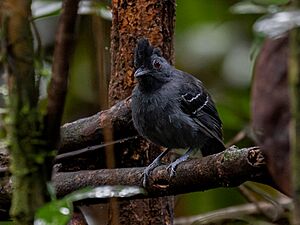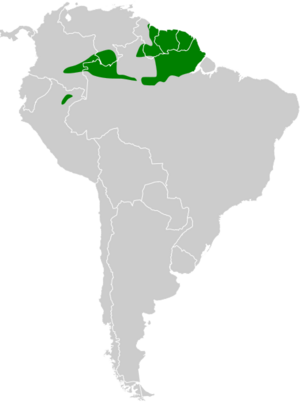Black-headed antbird facts for kids
Quick facts for kids Black-headed antbird |
|
|---|---|
 |
|
| Conservation status | |
| Scientific classification |
|
| Kingdom: | Animalia |
| Phylum: | Chordata |
| Class: | Aves |
| Order: | Passeriformes |
| Family: | Thamnophilidae |
| Genus: | Percnostola |
| Species: |
P. rufifrons
|
| Binomial name | |
| Percnostola rufifrons (Gmelin, JF, 1789)
|
|
 |
|
| Script error: The function "autoWithCaption" does not exist. | |
Script error: No such module "Check for conflicting parameters".
The black-headed antbird (Percnostola rufifrons) is a cool bird that lives in the forests of South America. It's part of the antbird family, which means it often hangs out near army ants, eating the insects that try to escape them! You can find this bird in countries like Brazil, Colombia, Peru, and Venezuela. It loves to live in warm, wet lowland forests.
Contents
About the Black-headed Antbird
The black-headed antbird is a type of passerine bird. This means it's a "perching bird," like many songbirds you might know. It belongs to the Thamnophilidae family, which are often called "antbirds."
Where it Lives
This bird lives in the tropical forests of South America. You can find it in several countries, including Brazil, Colombia, French Guiana, Guyana, Peru, Suriname, and Venezuela. It prefers moist lowland forests, which are warm and wet.
How Scientists Name Animals
Scientists give every animal a special two-part name, like Percnostola rufifrons for this bird. This system is called binomial nomenclature. It helps scientists all over the world know exactly which animal they are talking about.
The black-headed antbird was first officially described in 1789. A German scientist named Johann Friedrich Gmelin gave it its first scientific name. He used a book by Carl Linnaeus, who created the naming system we still use today.
The name rufifrons is interesting! It comes from Latin words. Rufus means "red" or "rufous," and frons means "forehead" or "front." So, its name hints at a reddish forehead.
Different Types of Black-headed Antbirds
Just like there can be different types of dogs, there are also different types of black-headed antbirds. Scientists call these "subspecies." They are slightly different versions of the same species, often living in different areas.
There are four known subspecies:
- P. r. rufifrons – Found in the Guianas and northeast Brazil.
- P. r. subcristata – Lives in northern Brazil.
- P. r. minor – Found in eastern Colombia, southwest Venezuela, and northwest Brazil.
- P. r. jensoni – Lives in northeast Peru.
 | John T. Biggers |
 | Thomas Blackshear |
 | Mark Bradford |
 | Beverly Buchanan |


